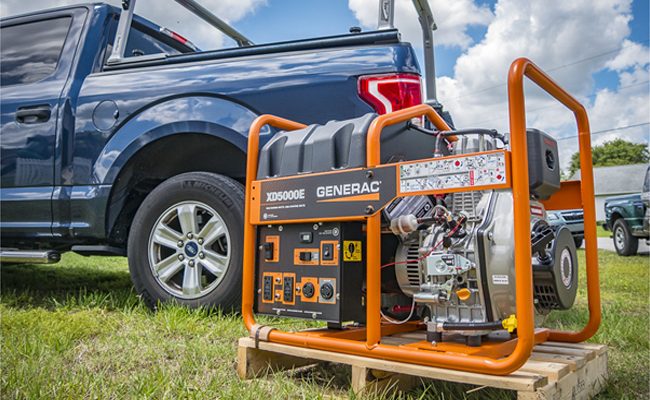
It’s always fun to go out to the backyard and have a party in the open air. It may be less fun but quite necessary to work with various equipment to keep your backyard in order. Both these activities require power, and if you cannot just throw an extension cord, you need a standalone power source for it.
Will a 3,000-watt inverter generator be the versatile solution you want, or should you find something more specialized? Maybe battery-powered equipment doesn’t have to be recharged right there if you have an extra battery or two? Let’s see which one is better.
Generators vs. Batteries
There are two ways to power electric devices with no outlet around: a generator or a battery. Which one is better? In short, it depends.
If you only need power for a certain number of tools you use in the backyard, you may just prepare the right set of batteries. Many outdoor equipment manufacturers (Greenworks, Black+Decker, etc.) produce versatile batteries compatible with various types of equipment by these brands. So, if you have, say, a chainsaw, a multitool, a lawn mower, and something else by the same brand, you just need to make sure they use compatible batteries and get some extra ones that can be used with any of them.
This won’t work if you go beyond one brand set. While many tools allow for that, you can also have BBQ grills, lights, speakers, and other recreational devices that need to be powered via standard outlets. There are rechargeable batteries capable of handling these tasks. Yet a generator will be a better solution, versatile and working for longer, good for both corded tools and recreational equipment.
What to Look at When Choosing a Generator
There are crucial parameters to mind when choosing a generator for your backyard. Let’s list some of them.
- To calculate the perfect capacity you need, sum the consumption of all your devices running simultaneously and add 20%. Then choose the model that exceeds that figure the least.
For example, you have a set of a George Foreman BBQ grill (1,440W), a JBL speaker (1,000W), and a string of 20 light bulbs, 5W each. To calculate the capacity you need, add it all up (1,440+1,000+100=2,540) and add 20% (2,540*1.2). The overall capacity you need will be 3,048 W. If you don’t pump up the volume to the max, a 3,000 W generator will do. But to be sure, you can opt for a 3,200 W model. The actual consumption may be lower as you put down the volume or unplug the speaker and use its built-in battery for a while. If you add, for example, a portable fridge or a DJ setup, it can raise the requirements up to 4,000 W.
- In general, gas generators are preferable. Modern models are rather quiet and eco-friendly, and you won’t have to go far to refuel such a model. If you’re going to throw big and long parties, diesel generators can also be considered because of their ability to work longer.
- Run time. How long is your party or work session going to be? Choose the run time according to your plans, and not for tomorrow only, but for the standard duration.
- It reduces the fuel consumption and the noise, adjusting the generator’s performance to the actual consumption, and makes the current stabler. Inverter generators are more expensive but less costly in the long run.
- Assuming your backyard is not that far from home, both handles and wheels will do well. The fuel tank capacity also contributes: it makes the generator heavier, but you can take fewer cans or tanks with you.
- Noise level. You can tolerate it while using corded tools, but it will spoil your fun, getting through even loud music at a party. Again, an inverter model does better at it.
- For an outdoor model, it’s important that it can stand sudden rain or other unexpected extreme weather (even though you’d hardly plan a party knowing it’s going to shower). You better search for a model with a protective canopy or purchase one separately.
- It’s not just about the environment. Even if you position it at least 20 feet away from the public and only approach it from time to time to check how it works, you still better have it the eco-friendliest possible.
Knowing this, you will surely be better prepared to buy the best generator you need. There may be more factors that we skipped somehow. If so, tell us about them, or share your experience in the comments!
Leave a Reply